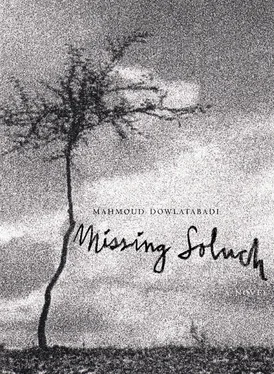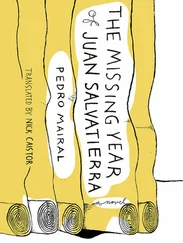Her sobbing prevented her from finishing the sentence. Hajer pleaded with her, “Don’t cry, please. Whatever you want. Just don’t cry, mother.”
A short while later, the sound of footsteps separated the two of them — it was Morad. He stood by the door and said, “I’m looking for Abbas!”
“Abbas went to tend the camels.”
Morad replied, “We’re heading out — a group of us have decided go to Gonbad together this year. I wanted to let Abbas know that if he wants to join us, he should come to our house tomorrow night. The others will come there too …”
Mergan said nothing. Something was caught in her throat. Morad turned on his heel and left. Mergan looked at her daughter; Hajer had hidden in a corner. Mergan rose, took the sacks and tools from beside the wall, and stepped outside before saying to Hajer, “Let’s get going to work; it’s well past breakfast …”
* * *
This day’s work would be whitewashing the dining room of Zabihollah’s home. The first task was to brush the walls clean.
Mergan busied herself with the task. She removed her evening chador, tied her headscarf, and took the broom from Hajer, who brought it over for her and began brushing from the doorframe. With every brush, an area of dust was wiped clean from the wall, settling instead on the ground. As always, Mergan was focused on her work. She carried out her work with the mastery of a sculptor molding clay. This was not only because she needed the work, but also because her own nature allowed her to master any task quickly. For this reason, she slowly came to take on all sorts of odd jobs that needed doing in Zaminej:
“Mergan dear, could you come and repair our walls …”
“Mergan dear, there’s a mourning wake at our house. My mother wants you to come and help pour tea for the visitors.”
“Mergan dear, my brother’s wedding …”
“Mergan dear, my father’s funeral …”
“Mergan dear, could you come to our house to help clean our blankets …”
“Mergan dear, could you bring a jug of water for the circumcision ceremony …”
“Mergan dear …”
Slowly, Mergan had begun to take on the role of everyone’s wife, everyone’s sister. When she busied herself with her work, her face took on such a focus that invariably her employer was compelled to respect and even fear her. It would be impossible for someone else to be her master while she worked, and she would never allow it. Some women, it’s true, were inclined to view Mergan as an indentured servant — women like Moslemeh. But Mergan would hardly countenance such sentiments, and much less so now than ever before. Although she could be good-natured, it was impossible to mistake it for obsequiousness. Mergan’s passion in her work was not a sign of her wish to please her employer, but came from her desire to master the task at hand. Mergan had come to learn that if she approached her work without passion or determination, she would be overwhelmed and defeated by it. So she tackled each task with an open heart. The nature of any work is that it can break you down, eventually destroy you. But it’s you who must resist, hold your own ground. And Mergan would not accept seeing herself as in servitude, or as abject before her work. She tackled and uprooted each task before her.
“Girl, go bring me the water sack and the gunny sack!”
Hajer took the broom from her mother and went to bring what her mother had asked for. Mergan loosened her headscarf, stuck her head out the doorway, and spit out the dust that had collected in her mouth and throat. A coating of dust had settled on her eyelashes, eyebrows, and the band of her hair not covered by the headscarf. Dirt marked an outline on her teeth and caked around her nostrils. She felt as if her throat was tightening. She shouted, “Hajer …! Have you gone to bring the water from the Zamzam Spring in Mecca?”
The girl was dragging the water sack with both hands with difficulty. Mergan stepped outside and took the water sack from her daughter and brought it into the room. First, she plunged her hands into the water and brought up handfuls of the liquid, sprinkling it into the air. Slowly, the dust subsided. Then she used a cup to sprinkle water on the walls and roof of the room. Hajer also did the same, but her work did not meet Mergan’s standards. So she took the cup from her daughter’s hand and continued to splash water on the ceiling. While dissolving the remaining grime from the walls and ceiling, the water also prepared the surfaces for whitewashing, as wet surfaces were better suited for the application of the whitewash.
Zahra, the bitter homebody sister of Zabihollah, brought out a pot of tea, glared at Mergan, and said, “If you’ve not had a cup of tea in the morning, have one now!”
Mergan splashed the last cup of water at a dry spot on the wall.
“I had tea this morning, but put the teapot and cups on the ground by the wall. We’ll have some more!”
Zahra put the cups and kettle down, grumbled under her breath, turned her thick buttocks around, and left the room.
Mergan looked at her daughter.
“What an oven of jealousy! She’s so envious she’s about to explode. She’d even be jealous of a desert bramble bush. Since she’s so beautiful!”
Hajer asked, “Shall I wet the clay?”
“Not now. Let’s have some tea first and let her stew over it. We’ll do it later!”
They arranged the cups and sat down. They drank cup after cup. Each sip was accompanied by a disparagement of Zahra, and each insult was accompanied by the sound of Mergan’s guffawing laughter. Mergan sensed that with each cup she was pricking Zahra’s heart with a pin. In the end, Zahra couldn’t hold back and she poked her head into the room.
“Not done having tea yet, are you?”
Mergan said, “Come and take this all away! There’s a bit of tea left in the bottom of the teapot. Take a cup and have some yourself!”
Zahra took away the teapot and cups, grumbling, “As if they’d just escaped a famine!”
Mergan imitated her mockingly, saying to herself, “I hope you die from jealousy!”
Hajer rarely saw her mother so happy. She attributed this joy to the success of her work, and to the fact that during the New Year’s season Mergan’s prosperity meant that she had become accustomed to the sound of coins and the color of bills. Hajer had not thought that the blood of youth could still course through her mother’s veins. Although Mergan appeared old and broken, inside she was not. Women of Mergan’s age, those who did not have the worries and problems that she had, are usually just reaching the heights of their womanhood. But alas, some are destined to age more quickly than others; Mergan was one of these. But one should not expect that in these cases, the vestiges of youth are completely erased. No, youth remains, if only hidden. Like something that is shameful, hidden in the far corners of the soul. It does not show itself, yet nevertheless it remains. It remains, wound up tightly inside, and given an opportunity or a momentary respite, it may show itself in the light of day. It waits, and if by chance the veil of age falls from one’s grim face, so does youth make a move and tear its own veil off without hesitation. Youth will not accept depression or anxiety; instead, it riots, crushing and destroying everything around it. It smashes all the walls that have risen around the soul, obliterating every barrier!
Perhaps it was because of this that Mergan, as she moved around and between her tasks, snapped her fingers in rhythms, strode around in characters, and like a blushing new bride, told jokes to Hajer. This may also explain why Mergan sang while she worked, calling out romantic lyrics to different songs without a second thought. Does love have to be evident and apparent for one to have the right to be called “in love”? Sometimes love is hidden, but it also still remains. It remains because it has not truly gone. What is love, after all? Is it only that which is evident? No, in fact, if love is evident, it is not truly love. When evident, it becomes knowledge, wisdom. Love, one might say, is actually only evident when it is not. It’s not apparent but it can be discerned. It riles … overturns … leads to dancing and clapping. It brings tears … beats … runs. It drives the love-maddened lover into the desert!
Читать дальше












